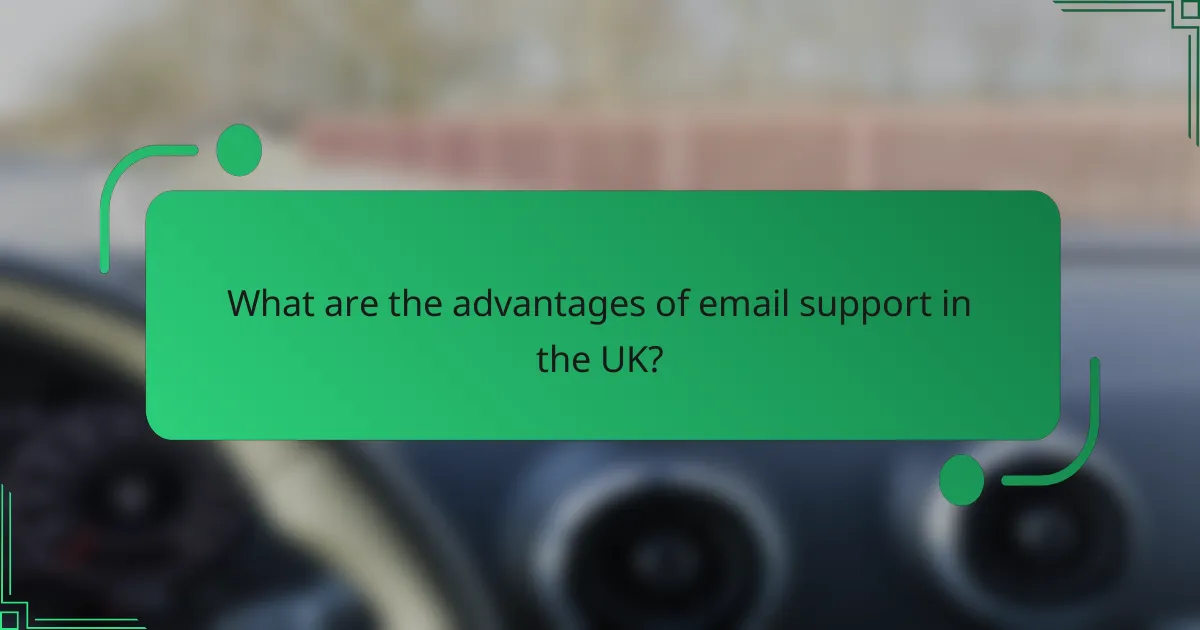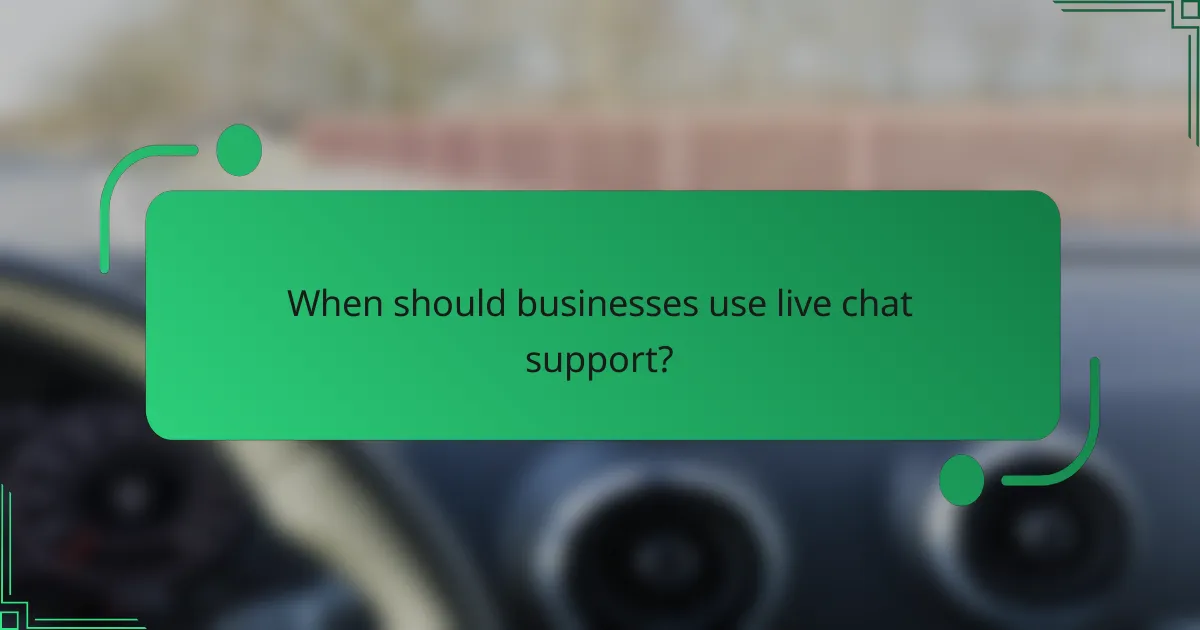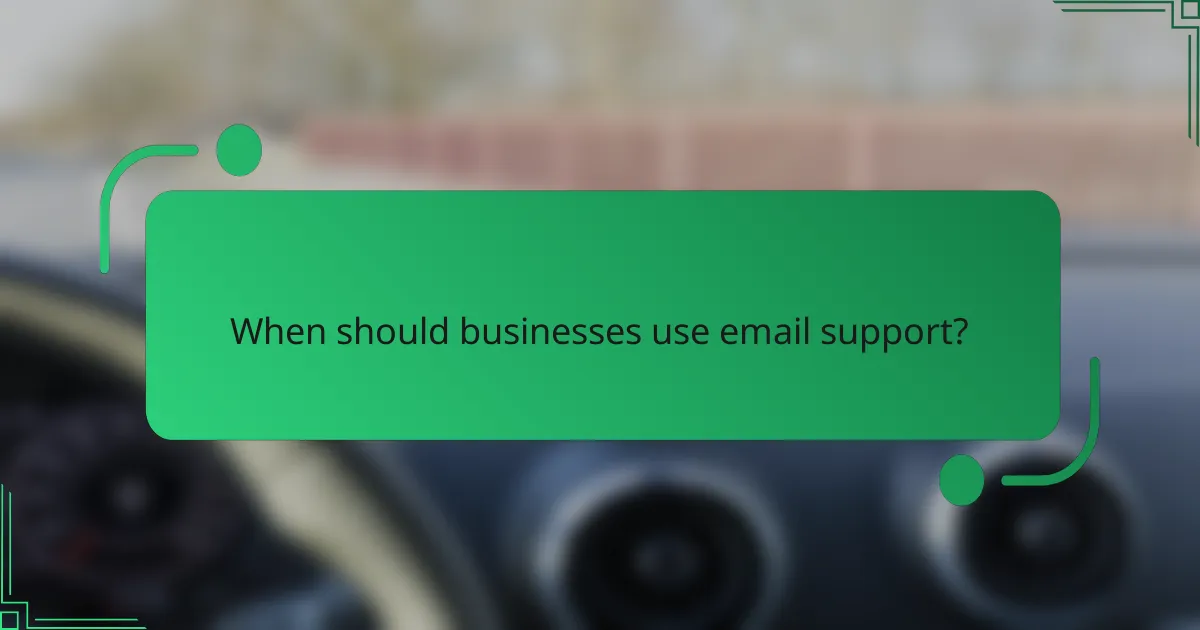When it comes to customer support, businesses in the UK often face the choice between live chat and email support. Live chat offers immediate assistance, enhancing customer satisfaction through quick responses, while email support provides detailed communication and flexibility. Understanding the strengths of each method can help businesses determine the best approach for different situations and customer needs.

What are the advantages of live chat support in the UK?
Live chat support offers several advantages for businesses in the UK, primarily through its immediacy and efficiency. It enables companies to address customer inquiries quickly, leading to enhanced satisfaction and engagement.
Instant response times
One of the key benefits of live chat support is its instant response times. Customers can receive answers to their questions in real-time, often within seconds. This immediacy can significantly reduce frustration and improve the overall customer experience.
In contrast to email support, which may take hours or even days for a response, live chat allows for immediate interaction. This is particularly advantageous during peak business hours when customers are more likely to seek assistance.
Increased customer satisfaction
Live chat support tends to lead to higher customer satisfaction rates. The ability to communicate directly with a representative can make customers feel valued and understood. Quick resolutions to their issues can foster loyalty and encourage repeat business.
Surveys often indicate that customers prefer live chat over other support channels due to its convenience and speed. This preference can translate into positive reviews and recommendations, enhancing a company’s reputation.
Higher engagement rates
Engagement rates are typically higher with live chat support compared to email. The interactive nature of chat encourages customers to ask questions and seek clarification, leading to more meaningful conversations. This can help businesses better understand customer needs and preferences.
Moreover, proactive chat invitations can be used to engage visitors on a website, prompting them to start a conversation. This proactive approach can significantly increase the likelihood of conversion.
Cost-effective for businesses
Live chat support can be a cost-effective solution for businesses. It allows support agents to handle multiple chats simultaneously, increasing efficiency and reducing the need for a large support team. This can lead to lower operational costs compared to traditional phone or email support.
Additionally, the quick resolution of customer issues can reduce the overall time spent on support, further contributing to cost savings. Many businesses find that the investment in live chat technology pays off through improved customer retention and satisfaction.
Multi-tasking capabilities
Live chat enables support agents to multi-task effectively. While assisting one customer, agents can manage other chats, allowing for a more streamlined workflow. This capability can lead to faster service and reduced wait times for customers.
Furthermore, agents can easily switch between different conversations, ensuring that no customer feels neglected. This flexibility is a significant advantage over email support, where each interaction is typically handled sequentially.

What are the advantages of email support in the UK?
Email support offers several advantages in the UK, including detailed responses, flexibility, and cost-effectiveness. It allows customers to communicate at their convenience while providing businesses with a written record of interactions.
Detailed responses
Email support enables customer service representatives to craft comprehensive and thoughtful responses. Unlike live chat, where quick replies are often necessary, email allows agents to research issues and provide detailed solutions. This can lead to higher customer satisfaction as inquiries are addressed more thoroughly.
Asynchronous communication
One of the key benefits of email support is its asynchronous nature, meaning customers can send inquiries at any time without needing an immediate response. This flexibility allows customers to communicate on their schedule, which can be particularly beneficial for those with busy lifestyles or differing time zones.
Documentation and tracking
Email support provides a clear record of all communications, making it easier for both customers and businesses to track issues over time. This documentation can be invaluable for resolving disputes or following up on previous interactions. Customers can refer back to past emails for information, while businesses can analyse trends and improve service quality.
Lower operational costs
Using email support can significantly reduce operational costs for businesses. Compared to live chat, which often requires more staff to manage real-time interactions, email allows for a more efficient use of resources. Companies can handle multiple inquiries simultaneously, reducing the need for a large support team.
Flexibility for customers
Customers appreciate the flexibility that email support offers, as they can compose messages at their convenience and attach relevant documents or screenshots. This can enhance the clarity of their inquiries and lead to quicker resolutions. Additionally, customers can easily revisit previous emails for reference, which is not always possible with live chat.

When should businesses use live chat support?
Businesses should consider using live chat support when they need to provide quick, real-time assistance to customers. This method is particularly effective during high traffic periods, for complex inquiries, and when immediate responses can significantly enhance customer satisfaction.
High traffic periods
During peak times, such as holiday seasons or promotional events, live chat support can manage multiple customer interactions simultaneously. This prevents long wait times that often occur with email support, ensuring that customers receive timely help. For instance, a retail website experiencing a surge in visitors may find live chat essential to handle inquiries efficiently.
Complex product inquiries
Live chat is ideal for addressing complex product inquiries that require detailed explanations or interactive guidance. Customers can ask questions and receive immediate clarification, which can lead to better-informed purchasing decisions. For example, a customer trying to understand the specifications of a technical gadget can benefit from real-time dialogue with a knowledgeable representative.
Immediate customer assistance
When customers need immediate assistance, live chat support is often the best option. This method allows businesses to resolve issues quickly, which can enhance customer loyalty and satisfaction. For example, if a customer encounters a problem during checkout, live chat can provide instant support to help complete the transaction smoothly.
Sales and lead generation
Live chat can be a powerful tool for sales and lead generation, as it allows businesses to engage potential customers in real-time. By answering questions and providing information during the decision-making process, businesses can increase conversion rates. For instance, a visitor on a service website may have questions that, when answered promptly through live chat, could lead to a successful sale.

When should businesses use email support?
Businesses should consider using email support for situations that require detailed communication or when immediate responses are not critical. Email allows for thorough explanations and documentation, making it suitable for various scenarios.
Non-urgent inquiries
Email support is ideal for non-urgent inquiries where customers do not require immediate assistance. This method allows customers to articulate their questions or concerns at their convenience, and businesses can respond thoughtfully without the pressure of real-time interaction.
For example, if a customer wants to inquire about a product’s specifications or availability, email provides a platform for detailed responses that can be referenced later. This approach can enhance customer satisfaction as they receive comprehensive information tailored to their needs.
Detailed troubleshooting
When customers face complex issues that require in-depth troubleshooting, email support is often the better choice. It enables support teams to provide step-by-step guidance and attach relevant documents or links for reference.
For instance, if a customer encounters a technical problem with software, an email can include detailed instructions, screenshots, and links to relevant resources. This ensures that the customer has all the necessary information in one place, which can be revisited as needed.
Follow-ups and feedback
Email support is effective for follow-ups and gathering customer feedback after a service interaction. It allows businesses to check in with customers regarding their satisfaction and any further questions they may have.
For example, after resolving an issue, a company can send a follow-up email asking if the solution was satisfactory and if the customer needs additional assistance. This not only shows that the business values customer input but also helps in identifying areas for improvement.